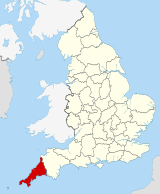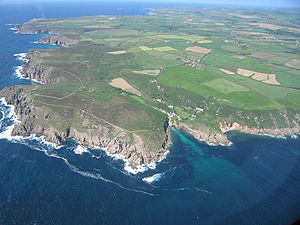Portal:Cornwall
  Cornwall (/ˈkɔːrnwɔːl, -wəl/; Cornish: Kernow; Cornish pronunciation: [ˈkɛrnɔʊ]; or [ˈkɛrnɔ]) is a ceremonial county in South West England. It is recognised by Cornish and Celtic political groups as one of the Celtic nations, and is the homeland of the Cornish people. The county is bordered by the Atlantic Ocean to the north and west, Devon to the east, and the English Channel to the south. The largest settlement is Falmouth, and the county town is the city of Truro. The county is rural, with an area of 1,375 square miles (3,562 km2) and population of 568,210. After Falmouth (23,061), the largest settlements are Penzance, Newquay, St Austell, and Truro. For local government purposes most of Cornwall is a unitary authority area, with the Isles of Scilly having a unique local authority. The Cornish nationalist movement disputes the constitutional status of Cornwall and seeks greater autonomy within the United Kingdom. Cornwall is the westernmost part of the South West Peninsula. Its coastline is characterised by steep cliffs and, to the south, several rias, including those at the mouths of the rivers Fal and Fowey. It includes the southernmost point on Great Britain, Lizard Point, and forms a large part of the Cornwall National Landscape. The national landscape also includes Bodmin Moor, an upland outcrop of the Cornubian batholith granite formation. The county contains many short rivers; the longest is the Tamar, which forms the border with Devon. (Full article...) Selected articleThe Camelford water pollution incident involved the accidental contamination of the drinking water supply to the town of Camelford, Cornwall, in July 1988. Twenty tonnes of aluminium sulphate was inadvertently added to the water supply, raising the concentration to 3,000 times the admissible level. As the aluminium sulphate broke down it produced several tonnes of sulphuric acid which "stripped a cocktail of chemicals from the pipe networks as well as lead and copper piping in people's homes." Many people who came into contact with the contaminated water experienced a range of short-term health effects, and many victims suffered long-term effects whose implications remained unclear . There has been no rigorous examination or monitoring of the health of the victims since the incident, which is Britain's worst mass poisoning event. Inquests on people who died many years later found very high levels of aluminium in the brain. Dame Barbara Clayton led a Royal Commission on Environmental Pollution enquiry into the incident. Immediately after the contamination the authorities said that the water was safe to drink, possibly with juice to cover the unpleasant taste. In an inquest in 2012 into the death of one of the victims, the coroner stated that South West Water Authority had been "gambling with as many as 20,000 lives" when they failed to inform the public about the poisoning for 16 days, a delay he called unacceptable. In the aftermath of the contamination the public were reassured that there was no risk to health. There were allegations of a cover-up and West Somerset Coroner Michael Rose stated: "I found there was a deliberate policy to not advise the public of the true nature until some 16 days after the occurrence of the incident." Following an investigation by the government's Committee on Toxicity of Chemicals in Food, Consumer Products and the Environment, Michael Meacher, the former Environment Minister, claimed that "various associated bodies tried to bury the inquiry from the start." Meacher told one newspaper: "This has become a tug of war between the truth and an attempt to silence the truth." An April 2013 report by the Lowermoor subgroup of the Committee on Toxicity of Chemicals in Food, Consumer Products and the Environment concluded that exposure to the chemicals was unlikely to cause "delayed or persistent harm" and was also unlikely to cause future ill health. In September 2013 the government admitted that there had been a "manifest failure to give prompt appropriate advice and information to affected consumers" and offered an unreserved apology. (Full article...)Selected biography
Admiral of the Blue Edward Boscawen, PC (19 August 1711 – 10 January 1761) was a British admiral in the Royal Navy and Member of Parliament for the borough of Truro, Cornwall, England. He is known principally for his various naval commands during the 18th century and the engagements that he won, including the siege of Louisburg in 1758 and Battle of Lagos in 1759. He is also remembered as the officer who signed the warrant authorising the execution of Admiral John Byng in 1757, for failing to engage the enemy at the Battle of Minorca (1756). In his political role, he served as a Member of Parliament for Truro from 1742 until his death although due to almost constant naval employment he seems not to have been particularly active. He also served as one of the Lords Commissioners of the Admiralty on the Board of Admiralty from 1751 and as a member of the Privy Council from 1758 until his death in 1761. (Full article...)
Did you know?
Selected quoteSelected picture
General imagesThe following are images from various Cornwall-related articles on Wikipedia.
WikiProjects
Related portalsTopicsHistory
Geography
Politics
Economy and demographics
Culture
SubcategoriesRecognised content
Featured articlesMain page featured articlesFeatured listsGood articles
Former good articlesIn the News articlesThings you can do'
Associated WikimediaThe following Wikimedia Foundation sister projects provide more on this subject:
Wikipedia in CornishDiscover Wikipedia using portals
| |||||||||||||||||||||||||||||||




































































